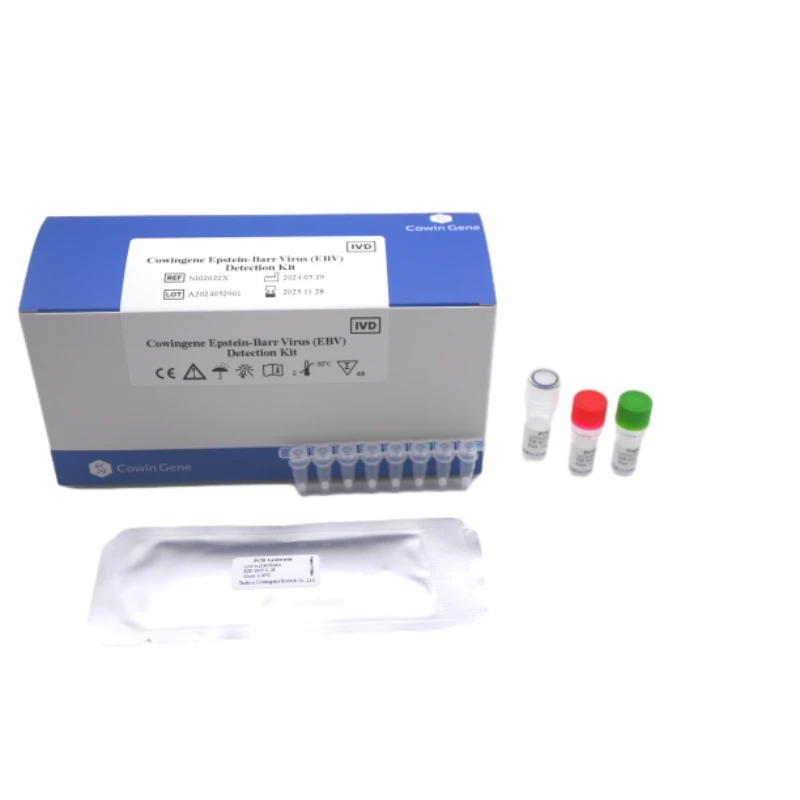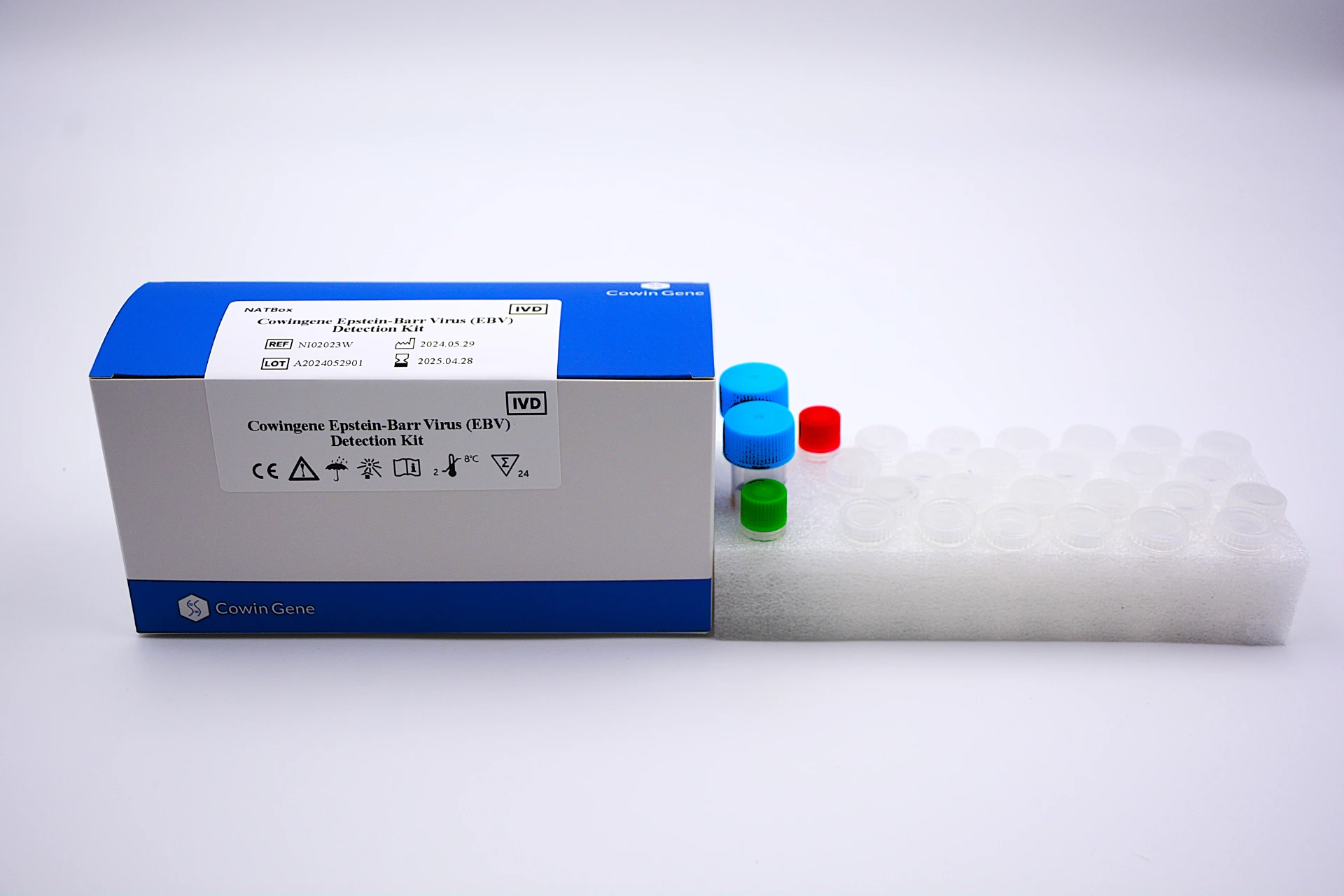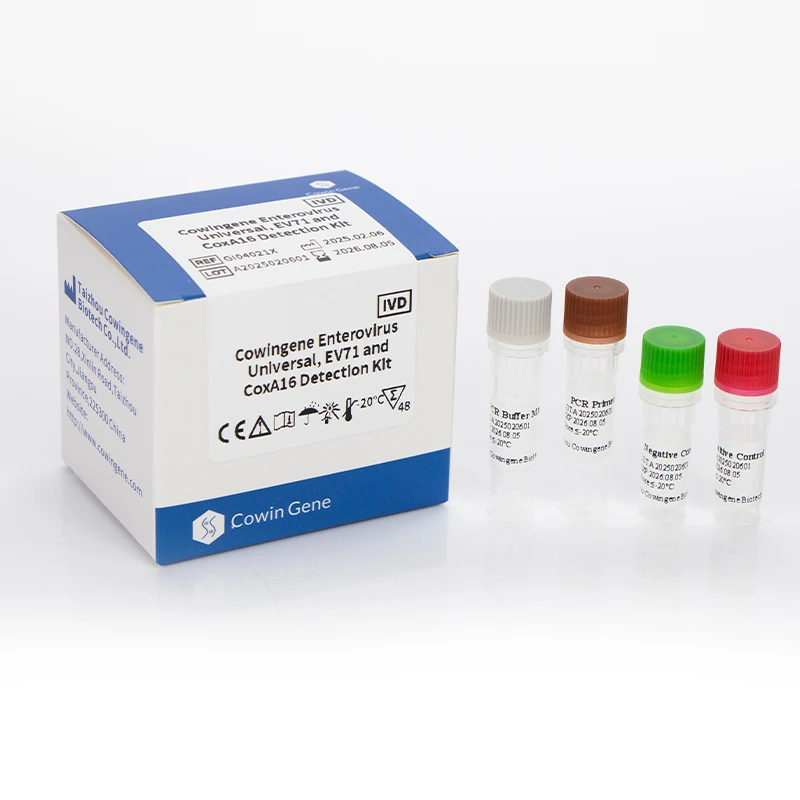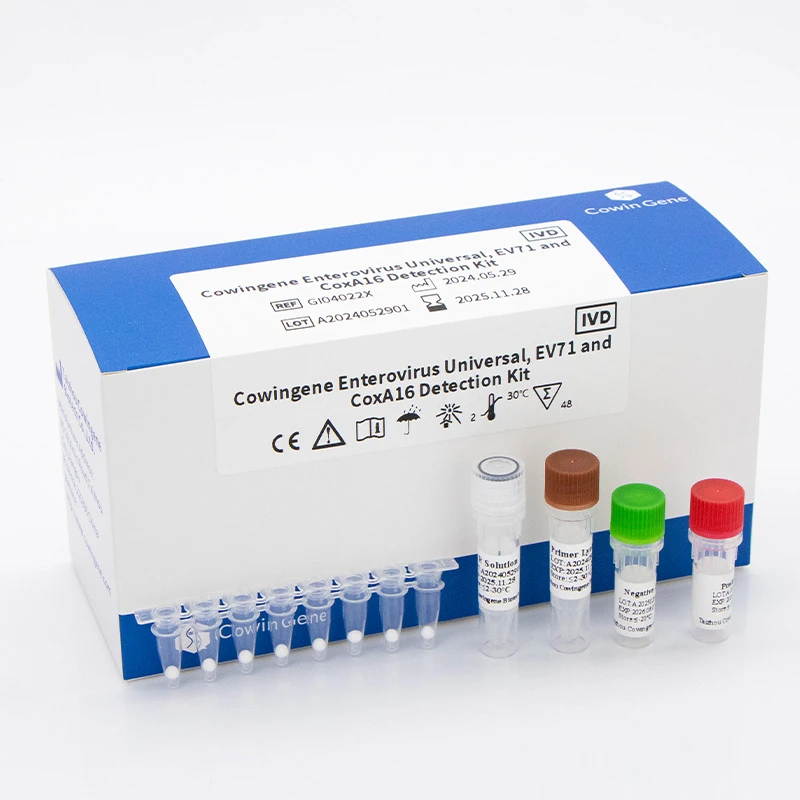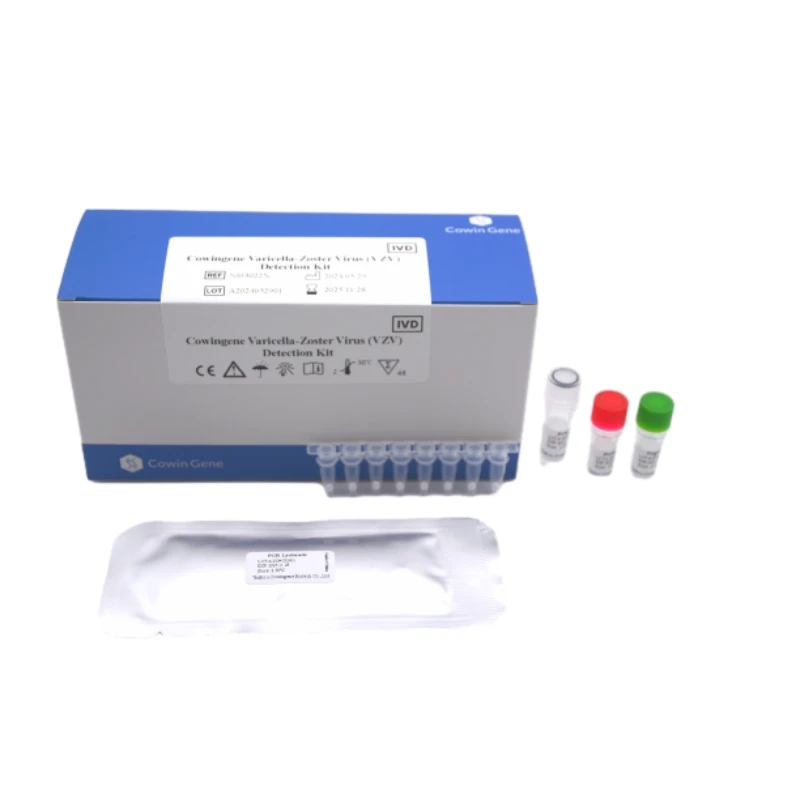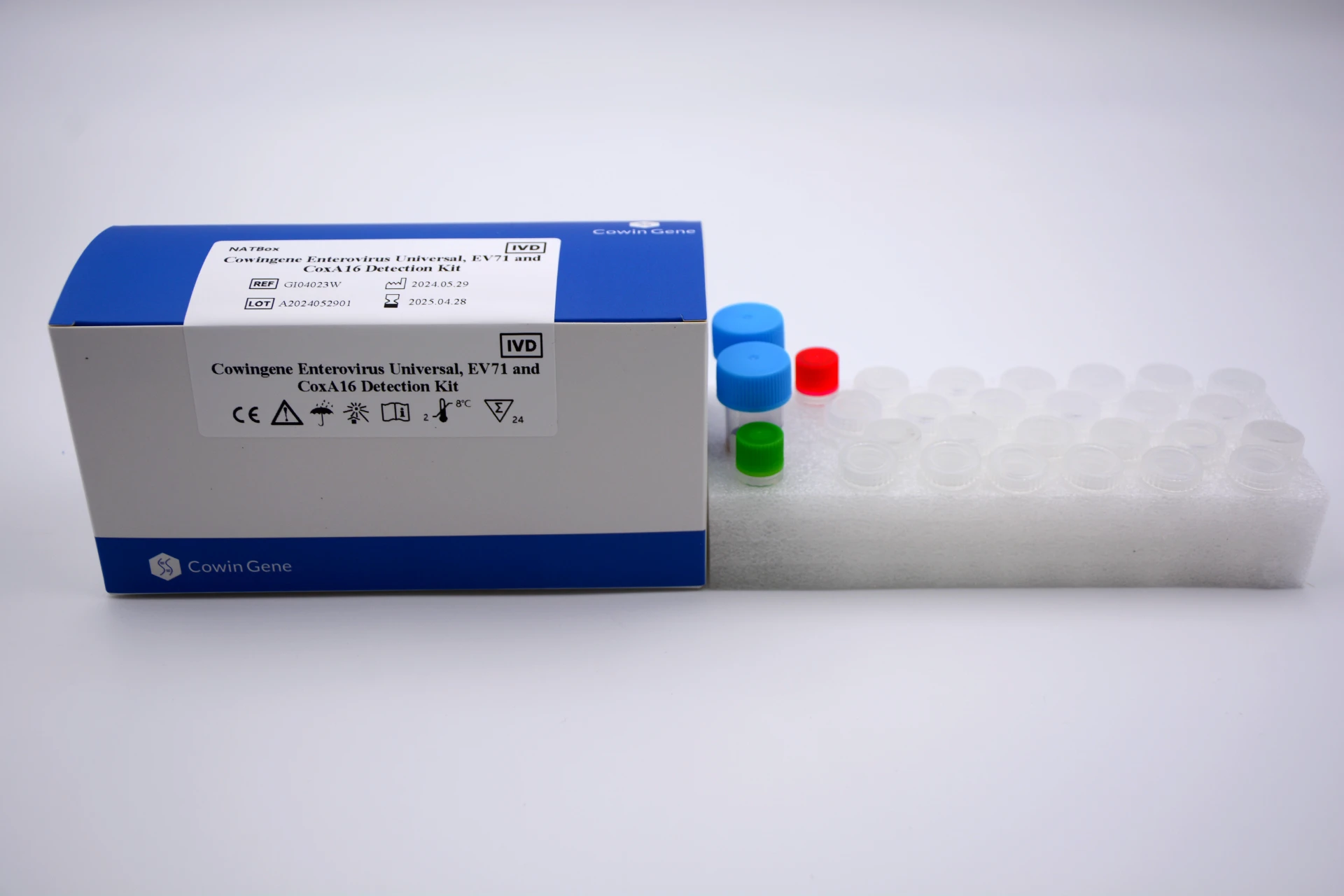Aug . 27, 2025 05:40 Back to list
Accurate Yellow Fever PCR Test Kits | Fast & Reliable Results
Advancing Diagnostics: The Critical Role of yellow fever pcr in Global Health Security
Yellow Fever, a mosquito-borne viral hemorrhagic disease, continues to pose a significant public health threat, particularly in tropical and subtropical regions of Africa and South America. Rapid and accurate diagnosis is paramount for effective disease management, outbreak control, and epidemiological surveillance. In this context, Nucleic Acid Amplification Tests (NAATs), specifically Polymerase Chain Reaction (PCR), have emerged as the gold standard for detecting the Yellow Fever Virus (YFV) early in the infection cycle. The utility of advanced diagnostic tools, such as the Cowingene Yellow Fever Virus Detection Kit, is instrumental in providing timely and precise identification of the pathogen, thereby enabling crucial clinical and public health interventions. This article delves into the technical intricacies, application scenarios, and broader impact of yellow fever pcr in modern diagnostics, catering to the exacting requirements of B2B decision-makers and technical professionals.
The demand for highly sensitive and specific diagnostic solutions is ever-increasing, driven by the global interconnectedness and the potential for rapid disease spread. For instance, while focusing on Yellow Fever, the broader landscape of arboviral diagnostics also includes the critical need for advanced chikungunya test kit solutions, reflecting the complexity of differential diagnosis in endemic areas. Understanding the technical specifications and operational advantages of these kits is vital for laboratories and healthcare providers aiming to enhance their diagnostic capabilities.
Process Flow: Manufacturing of Advanced Yellow Fever Virus Detection Kits
The production of a high-quality yellow fever pcr detection kit, like the Cowingene Yellow Fever Virus Detection Kit, involves a meticulously controlled, multi-stage manufacturing process to ensure consistent performance, sensitivity, and specificity. This process adheres strictly to international quality management standards such as ISO 13485:2016 for medical devices.
Schematic Steps in Kit Manufacturing:
- Raw Material Sourcing & Qualification: High-purity oligonucleotides (primers and TaqMan probes specific to YFV target sequences like the 5'UTR or NS3 gene), reverse transcriptase, Taq DNA polymerase, dNTPs, and reaction buffers are sourced from validated suppliers. Each batch undergoes rigorous quality control for purity, concentration, and absence of contaminating nucleases or inhibitory substances.
- Component Synthesis & Purification: Primers and probes are synthesized using phosphoramidite chemistry, followed by multiple purification steps (e.g., HPLC) to achieve >95% purity. Enzymes are produced through recombinant DNA technology and purified to an ultra-high standard, ensuring optimal activity and stability.
- Buffer Preparation & Formulation: Proprietary reaction buffers are prepared under stringent aseptic conditions, incorporating stabilizers and enhancers to optimize PCR efficiency and shelf-life. Components are precisely measured and mixed to ensure optimal reaction kinetics for reverse transcription and PCR amplification.
- Kit Assembly & Lyophilization: Master mix components (primers, probes, enzymes, dNTPs, buffer) are dispensed into reaction tubes or plates. For enhanced stability and ease of transport, many advanced kits utilize lyophilization (freeze-drying) to remove water, creating a dry, stable reagent pellet. This process mitigates the need for continuous deep-freeze storage for some components, improving service life and reducing cold chain requirements.
-
Quality Control & Testing (ISO/ANSI Standards):
- Analytical Sensitivity: Determined by Limit of Detection (LoD) studies using serially diluted viral RNA standards, often as low as 10-50 copies/mL.
- Analytical Specificity: Cross-reactivity panel testing against common pathogens, including other arboviruses (e.g., Dengue, Zika, Chikungunya, Japanese Encephalitis), ensures no false positives.
- Repeatability & Reproducibility: Tested across different operators, instruments, and days to ensure consistent results.
- Stability Testing: Accelerated and real-time stability studies determine the product’s shelf life and storage conditions.
- GMP/GLP Compliance: All stages adhere to Good Manufacturing Practices (GMP) and Good Laboratory Practices (GLP) for medical device production.
- Packaging & Labeling: Kits are packaged with desiccant to prevent moisture degradation and clearly labeled with lot numbers, expiry dates, and regulatory information. The packaging is designed to protect components during transit and storage.
The service life of such kits typically ranges from 12 to 24 months when stored under recommended conditions (-20°C for liquid reagents, 2-8°C for lyophilized components after reconstitution). Target industries include clinical diagnostic laboratories, public health agencies, research institutions, and governmental biodefense programs globally, particularly those in endemic regions or involved in international travel health surveillance.
A primary advantage in typical application scenarios is the energy saving aspect derived from lyophilized reagents reducing the reliance on ultra-low freezers, thereby lowering operational costs for laboratories in resource-limited settings. Furthermore, the inherent design for robust performance minimizes false positives, which is crucial for public health decision-making. The Cowingene kit exemplifies precision engineering in molecular diagnostics, offering unparalleled reliability.
Industry Trends in Arbovirus Diagnostics and yellow fever pcr
The landscape of arbovirus diagnostics is continually evolving, driven by technological advancements and the dynamic epidemiology of diseases like Yellow Fever, Dengue, Zika, and Chikungunya. Current trends highlight a push towards increased automation, multiplex PCR assays, and point-of-care (POC) testing solutions.
- Multiplex PCR: The ability to detect multiple pathogens simultaneously from a single sample is gaining traction. This is especially relevant in regions where co-circulation of various arboviruses (e.g., Yellow Fever, Dengue, Chikungunya) makes differential diagnosis critical. Multiplexing reduces turnaround time and conserves precious sample material.
- Lyophilized Reagents: As mentioned, the widespread adoption of lyophilized yellow fever pcr reagents significantly simplifies logistics, reduces cold chain dependency, and extends shelf-life, making these kits ideal for deployment in remote or resource-limited settings.
- Digital PCR (dPCR): Emerging as an advanced quantitative method, dPCR offers absolute quantification of viral load without the need for a standard curve, providing higher sensitivity and precision, particularly for low viral titers.
- Automation and Throughput: To meet the demands of large-scale testing during outbreaks or for routine surveillance, there's a growing need for automated RNA extraction and PCR setup systems. This enhances laboratory efficiency and reduces human error.
- Integrated Solutions: Providers are increasingly offering comprehensive solutions that include not only the diagnostic kits but also compatible instrumentation, software for data analysis, and technical support, streamlining the entire diagnostic workflow. This holistic approach ensures optimized performance of a chikungunya test kit or any other arboviral diagnostic.
These trends underscore the importance of continuous innovation in molecular diagnostics to stay ahead of evolving public health challenges.
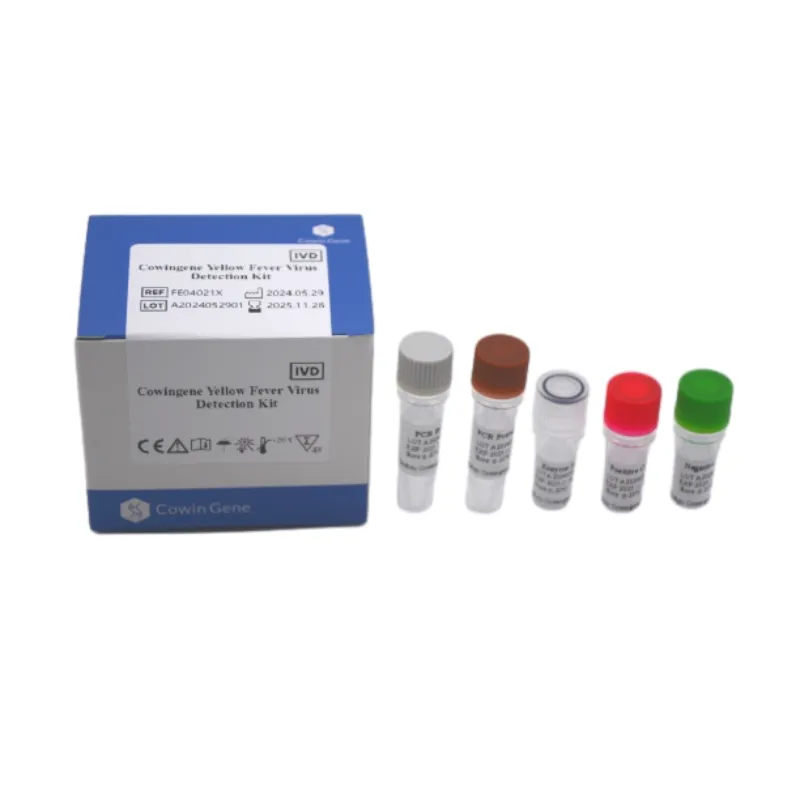
Technical Specifications: Cowingene Yellow Fever Virus Detection Kit
The Cowingene Yellow Fever Virus Detection Kit is engineered for precision and reliability, meeting the stringent demands of clinical and public health laboratories. Below are the key technical parameters that define its performance.
| Parameter | Specification | Relevance to yellow fever pcr |
|---|---|---|
| Assay Type | Real-time Reverse Transcription PCR (RT-PCR) | Detects YFV RNA directly, suitable for early acute phase. |
| Target Genes | YFV conserved genomic regions (e.g., 5'UTR, NS3) and Internal Control (IC) | Ensures high specificity and monitors extraction/amplification. |
| Limit of Detection (LoD) | ≤ 20 RNA copies/mL | High analytical sensitivity for early and low viral load detection. |
| Clinical Sensitivity | >98% (confirmed clinical samples) | Reliable detection in actual patient samples. |
| Clinical Specificity | >99.5% (non-YFV samples, including other arboviruses) | Minimizes false positives, crucial for differential diagnosis. |
| Sample Types | Serum, Plasma, Cerebrospinal Fluid (CSF), Urine, Tissue homogenate | Versatile applicability across various clinical matrices. |
| Reaction Time | Approx. 90-120 minutes (after RNA extraction) | Fast turnaround time for urgent clinical decisions. |
| Storage Conditions | -20°C for reagents; Lyophilized components stable at 2-8°C post-shipment for short periods. | Ensures reagent stability and minimizes cold chain stress. |
| Shelf Life | 18 months from manufacturing date | Economical for inventory management. |
| Compatibility | Most common real-time PCR instruments (e.g., Applied Biosystems, Bio-Rad, Roche LightCycler) | Flexible integration into existing lab infrastructure. |
Application Scenarios and Technical Advantages
The applications for a robust yellow fever pcr kit are extensive, ranging from routine clinical diagnosis to complex public health surveillance. Its technical advantages are critical in these diverse settings.
Key Application Scenarios:
- Early Clinical Diagnosis: Crucial for identifying acute infections before the onset of antibodies, allowing for prompt patient management and isolation to prevent further transmission.
- Outbreak Surveillance & Control: Rapid detection capabilities are essential for mapping disease spread, identifying hotspots, and implementing targeted public health interventions like vaccination campaigns.
- Differential Diagnosis: In regions endemic for multiple arboviruses, yellow fever pcr provides definitive diagnosis, distinguishing it from clinically similar diseases such as Dengue, Zika, and even more broadly, other febrile illnesses that might require a chikungunya test kit.
- Blood Safety Screening: While not universally implemented, in areas with high prevalence, molecular testing can be used to screen blood donations to prevent transfusion-transmitted YFV.
- Vaccine Efficacy Monitoring: PCR can be used in research settings to assess viral clearance or infection rates post-vaccination.
Technical Advantages of Cowingene Yellow Fever Virus Detection Kit:
- High Sensitivity and Specificity: Minimized false negatives and positives, critical for accurate patient care and public health decision-making. The detection of conserved genomic regions ensures broad detection across YFV strains.
- Integrated Internal Control: Ensures validity of negative results by confirming successful RNA extraction and absence of PCR inhibition, a key feature for robust diagnostic performance.
- Rapid Turnaround Time: Allows for faster clinical intervention and quicker public health responses to potential outbreaks.
- Lyophilized Reagents (Optional Configuration): Offers enhanced stability at room temperature, significantly reducing reliance on complex cold chain logistics, which is particularly beneficial for field deployment and in regions with unreliable power infrastructure. This also contributes to energy saving.
- User-Friendly Protocol: Streamlined workflow suitable for laboratories with varying levels of molecular diagnostics experience, reducing training overheads and operational complexity.

Vendor Comparison and Customized Solutions
Choosing the right diagnostic kit provider is a critical decision for any laboratory or public health entity. While various manufacturers offer yellow fever pcr solutions, Cowingene distinguishes itself through a commitment to quality, performance, and customer-centric approaches.
Key Factors for Vendor Comparison:
- Performance Metrics: Directly compare LoD, sensitivity, and specificity. Cowingene's kit stands out with a robust LoD of ≤ 20 RNA copies/mL, ensuring early and reliable detection.
- Regulatory Approvals: Prioritize vendors with kits holding relevant certifications (e.g., CE IVD, ISO 13485 manufacturing). Cowingene products are manufactured under ISO 13485:2016 certified quality systems.
- Kit Format & Stability: Evaluate if the kit format (liquid vs. lyophilized) and storage conditions align with operational capabilities and cold chain infrastructure. Cowingene offers options to suit varied logistical needs.
- Technical Support & Training: A strong support system is vital. Cowingene provides comprehensive pre- and post-sales technical assistance and training programs.
- Cost-Effectiveness & Value: Beyond the chikungunya test kit price or Yellow Fever kit price, consider the total cost of ownership, including shipping, storage, and potential re-runs due to lower quality kits.
Customized Solutions:
Cowingene understands that different laboratories have unique needs. We offer tailored solutions to integrate our yellow fever pcr kits seamlessly into diverse laboratory workflows:
- Bulk Packaging Options: For large-scale public health programs or reference laboratories, kits can be supplied in larger quantities or customized formats to optimize handling and reduce waste.
- Integration with Automation: Consultation and support for integrating our kits with automated nucleic acid extraction and PCR setup platforms.
- Multiplex Panel Development: For laboratories requiring the simultaneous detection of Yellow Fever with other arboviruses, Cowingene can explore the development of custom multiplex PCR panels, leveraging our expertise in primer and probe design.
- Regulatory Support: Assistance with documentation and validation data for regional regulatory submissions, helping clients navigate complex approval processes.
Application Case Studies
Our commitment to delivering reliable diagnostic solutions is evidenced by successful deployments in various challenging environments.
Case Study 1: Early Outbreak Detection in a Sub-Saharan African Nation
During a suspected Yellow Fever outbreak in a remote district of a Sub-Saharan African country, the National Public Health Laboratory deployed the Cowingene Yellow Fever Virus Detection Kit (lyophilized format). Due to limited cold chain infrastructure, the kit's room-temperature stability was critical. Over a period of three weeks, 450 patient samples presenting with acute febrile illness were tested. The yellow fever pcr kit identified 78 positive cases, often within 48 hours of sample collection, significantly faster than traditional serological methods. This rapid confirmation allowed health authorities to quickly isolate infected individuals, initiate targeted vaccination campaigns, and implement vector control measures, effectively curbing the spread of the disease. The high sensitivity of the kit enabled detection even in early-stage infections with low viral loads, which was pivotal for prompt intervention.
Case Study 2: Differentiation of Arboviral Infections in a South American Clinical Laboratory
A major clinical diagnostics laboratory in a South American country frequently encounters patients with non-specific febrile symptoms, making differential diagnosis of arboviruses challenging. The lab adopted the Cowingene Yellow Fever Virus Detection Kit alongside other specific tests, including a chikungunya test kit, as part of a comprehensive diagnostic panel. In one instance, a patient returning from an endemic area presented with symptoms that could align with Yellow Fever or Chikungunya. Using the Cowingene yellow fever pcr kit, a positive result for YFV was obtained, while the chikungunya test was negative. This precise diagnosis prevented misclassification and ensured the patient received appropriate, specific care and public health monitoring, highlighting the kit's crucial role in accurate differential diagnosis in co-endemic regions.
Frequently Asked Questions (FAQ)
- Q: What sample types are compatible with the Cowingene Yellow Fever Virus Detection Kit?
- A: The kit is validated for use with serum, plasma, cerebrospinal fluid (CSF), urine, and tissue homogenates, offering broad applicability for various clinical scenarios.
- Q: Can this yellow fever pcr kit differentiate between wild-type infection and vaccine-related viremia?
- A: The kit detects the presence of Yellow Fever viral RNA. Differentiation between wild-type and vaccine strain requires additional genotyping or sequencing methods, which are beyond the scope of this diagnostic kit.
- Q: What is the estimated lead time for bulk orders?
- A: Standard lead time for orders up to 1,000 kits is typically 2-3 weeks. For larger, customized orders, lead times can extend to 4-6 weeks, subject to material availability and manufacturing schedules. We recommend contacting our sales team for precise fulfillment details.
- Q: What warranty does Cowingene provide for its yellow fever pcr kits?
- A: All Cowingene kits are warranted to perform according to specifications until their stated expiry date, provided they are stored and used as per the instructions for use (IFU). We offer a 12-month warranty from the date of shipment for any manufacturing defects.
Lead Time, Fulfillment, Warranty & Customer Support
Fulfillment & Lead Time:
Cowingene is committed to efficient order fulfillment. Our standard production capacity allows for shipment of most orders within 2-3 weeks of confirmation. For urgent requests or large-volume procurements, we encourage direct communication with our sales and logistics teams to explore expedited options and tailored production plans. Our global distribution network ensures timely and secure delivery, adhering to cold chain requirements where applicable.
Warranty Commitments:
Cowingene stands behind the quality and performance of its Yellow Fever Virus Detection Kit. Our products are manufactured under ISO 13485:2016 certified quality management systems and are subject to rigorous quality control processes. We offer a comprehensive warranty ensuring that the kit will perform to its stated specifications until the expiration date printed on the packaging, provided it is stored and handled in accordance with the provided Instructions For Use (IFU). Any performance discrepancies attributable to manufacturing defects are covered under this warranty. Customers are encouraged to report any issues promptly for investigation and resolution.
Customer Support:
Cowingene provides dedicated technical support services to ensure optimal utilization of our yellow fever pcr kits. Our team of experienced molecular biologists and technical specialists is available to assist with:
- Protocol optimization and troubleshooting.
- Instrument compatibility and setup guidance.
- Data interpretation and quality control inquiries.
- On-site or remote training sessions for laboratory personnel.
Our commitment extends beyond product delivery, offering a partnership approach to help laboratories achieve accurate and reliable diagnostic outcomes.
Conclusion
The Cowingene Yellow Fever Virus Detection Kit represents the pinnacle of modern molecular diagnostics for Yellow Fever. Its robust technical specifications, coupled with meticulous manufacturing processes and a strong emphasis on quality, ensure high sensitivity, specificity, and reliability critical for both routine clinical use and urgent public health responses. By understanding the intricate process flow, appreciating the technical advantages, and considering the broader industry trends, B2B decision-makers can confidently select and deploy Cowingene's yellow fever pcr solution to enhance diagnostic capabilities and bolster global health security against this formidable arboviral threat. The ability to quickly and accurately diagnose Yellow Fever, and indeed other arboviruses like Chikungunya with a reliable chikungunya test kit, is not merely a technical advantage but a crucial public health imperative.
References
- World Health Organization. Yellow fever. Available at: https://www.who.int/news-room/fact-sheets/detail/yellow-fever
- Centers for Disease Control and Prevention. Yellow Fever Virus. Available at: https://www.cdc.gov/yellowfever/index.html
- European Centre for Disease Prevention and Control. Yellow fever. Available at: https://www.ecdc.europa.eu/en/yellow-fever
- ISO 13485:2016 Medical devices — Quality management systems — Requirements for regulatory purposes. International Organization for Standardization.
Related PRODUCTS
-
Comprehensive Guide to Monkey Pox Detection: Methods, Applications & Innovations
NewsNov.23,2025 -
Essential Guide to Monkeypox Detection: Technologies, Applications & Future Trends
NewsNov.23,2025 -
Understanding Strep B Test Cost: Global Insights and Healthcare Impact
NewsNov.22,2025 -
Group B Strep DNA Test – Fast, Accurate Screening to Prevent Neonatal Infection
NewsNov.21,2025 -
Essential Guide to Group B Strep Test Kits: Benefits, Uses & Innovations
NewsNov.20,2025 -
Group B Strep PCR Test – Rapid and Accurate Detection for Improved Newborn Health
NewsNov.20,2025


